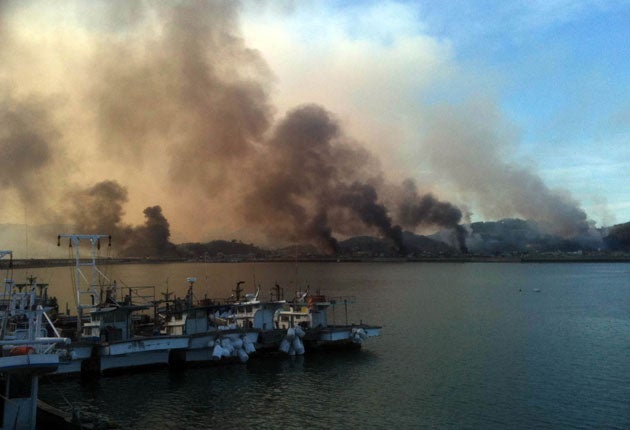Japan's top government spokesman said today that North Korea's firing of dozens of artillery shells at a South Korean island was "unforgiveable".
Chief Cabinet Secretary Yoshito Sengoku told a news conference in Tokyo that Japan "strongly condemns" the North Korean strike on the island, which marked one of the heaviest attacks on its neighbour since the Korean War ended in 1953.
The South fired back and sent a fighter jet to the area, which is close to a disputed maritime border on the west of the divided peninsula and the scene of deadly clashes in the past. South Korea was conducting military drills in the area at the time but said it had not been firing at the North.
The United States, which has 28,000 troops in South Korea, condemned the attack, but said it was too soon to discuss ways the US military might deter the reclusive communist state from another strike.
The incident followed revelations over the weekend that Pyongyang is fast developing another source of material to make atomic bombs, and analysts said the North may again be pursuing a strategy of calculated provocations to wrest diplomatic and economic concessions from the international community.
It also follows moves by leader Kim Jong-il to make his youngest, but unproven, son his heir apparent, leading some analysts to suggest the bombardment might in part have been an attempt to burnish the ruling family's image with the military.
"Houses and mountains are on fire and people are evacuating. You can't see very well because of plumes of smoke," a witness on the island told YTN Television.
YTN said at least 200 North Korean shells hit Yeonpyeong, which lies off the west coast of the divided peninsula near a disputed maritime border. Most landed on a military base there.
Photographs from the island, 75 miles west of Seoul, showed smoke rising from buildings. Two soldiers were killed and 17 wounded. Three civilians were hurt.
Experts say North Korea's Kim has for decades played a carefully calibrated game of provocation to squeeze concessions from the international community and impress his own military. The risk is that the leadership transition has upset this balance and that events spin out of control.
South Korean President Lee Myung-bak, who has pursued a hard line with the North since taking office nearly three years ago, said attacking civilians was unforgivable and any further aggression by Pyongyang would be severely punished.
But he made no suggestion the South would retaliate further, suggesting Seoul was taking a measured response to prevent things getting out of hand.
The North has a huge array of artillery pointed at Seoul that could decimate an urban area home to around 25 million people and cause major damage to its trillion-dollar economy.
The two Koreas are still technically at war - the Korean War ended only with a truce - and tension rose sharply early this year after Seoul accused the North of torpedoing one of its navy vessels, killing 46 sailors.
North Korea said its wealthy neighbour started the fight.
"Despite our repeated warnings, South Korea fired dozens of shells from 1pm. ... and we've taken strong military action immediately," its KCNA news agency said in a brief statement.
South Korea said it had been conducting military drills in the area beforehand but had fired west, not north.
The White House said it was committed to defending the South, but the Pentagon said no steps were yet being taken to respond.
"Right now it's too soon. This happened several hours ago, so I wouldn't say we're looking at anything in particular at this point," said Colonel Dave Lapan, a Pentagon spokesman, asked whether the military was eyeing ways to deter the North.
The United States has about 28,000 troops in South Korea, their combined forces facing an estimated 1 million North Korean soldiers in one of the world's biggest standing armies.
Stephen Bosworth, the US envoy on North Korea who was in Beijing for talks, said all sides agreed restraint was needed. "We both share a view that such conflict is very undesirable, and I expressed to them the desire that restraint be exercised on all sides and I think we agree on that," he told reporters.
China was careful to avoid taking sides, calling on both Koreas to "do more to contribute to peace."
At the United Nations, Security Council diplomats said discussions were under way over when and how to take up the issue.
Russian Foreign Minister Sergei Lavrov called the escalation in tensions a "colossal danger."
Washington has branded the North a danger to the region and expressed concern Pyongyang would sell nuclear weapons technology to other states. It has said it was ready to return to negotiations with North Korea but wants to see more commitment to denuclearization beforehand.
"It's unbelievable," said Zhu Feng, professor of international relations at Peking University. "Today's news proves that North Korea, under unprovoked conditions, shot these South Korean islands. It's reckless provocation. They want to make a big bang and force the negotiations back into their favor. It's the oldest trick."
The North depends heavily on China for economic and diplomatic support and Kim Jong-il has visited China twice this year, in part to gain backing for his succession plans.
Those ties have become a sore point with Washington after reports that North Korea appears to have made big steps towards enriching uranium, possibly using technology that passed through or even originated in China.

Join our commenting forum
Join thought-provoking conversations, follow other Independent readers and see their replies
0Comments